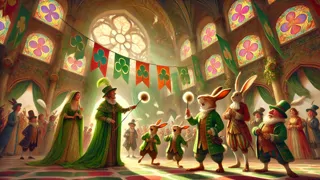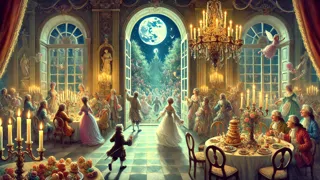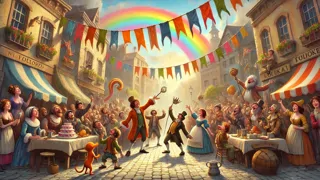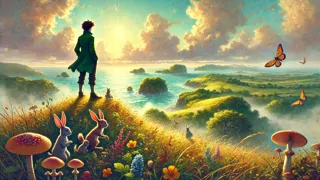Introduction
In the dew-laden dawn, Gulliver stood atop a coastal bluff, boots damp from sprays whipped by the wind’s careless hand. The Emerald Isles stretched before him—a tapestry of green so impossibly vivid it hurt the eyes of the skeptical, and delighted those willing to believe. Ireland, yes, but unlike any mapped by tooth-and-nail imperial cartographers or sung about by misty-eyed bards. This was a land stitched from legend and satire, sprinkled with improbable creatures, eloquent ghosts, and fields with a knack for whispering secrets to anyone who paused to listen.
For Gulliver, arrival here began with a mishap: a rogue gale, a tangle of storm-tossed sails, the boat’s timbers creaking like the bones of an old storyteller caught between exaggeration and truth. He washed ashore not to the howls of wolves or the scorn of mercenary smugglers, but to the bemused stares of a parliament of hares debating the merits of daylight savings. Even for a man who had once towered over the Lilliputians and dined with learned horses, the place brimmed with curiosities.
The local folk—some human, many not—sported fashions stitched from peat moss and storm clouds, greeted strangers with riddles threaded through honeyed brogues, and accepted magical occurrences as blithely as the rising sun. Here, saints lingered long after canonization, taking tea with banshees, and the faeries convened nightly councils on how best to meddle in mortal mischief. Gulliver felt both at home and spectral, an island of skepticism lapped by waves of wonder—a visitor determined to take notes but soon swept into narrative himself.
Power here was as slippery as boggrass: kings presided over petty fiefdoms defined by the breadth of their cabbage patches, and revolutionaries nursed grand ideas and even grander cups of tea. Love was fierce, often accidental, and always skittered ahead of logic, ducking behind hedges of flaming gorse. As the morning mist burned away, Gulliver’s quest became clear: to traverse these fantastical realms, to puzzle out the hierarchies of love and authority, and to unveil the peculiar, persistent follies dressing themselves as wisdom on the Emerald stage. What followed would be a journey stitched with laughter, tangled with satire, and brightened with revelations—where lessons arrived disguised in jest and every encounter begged his skeptical heart to surrender, if only for the day.
The Kingdoms of Clover and Contradiction
The journey began humbly. Gulliver, still damp with sea brine, was soon swept along a footpath that twined through a country straight from the pages of a feverish natural philosopher—where the moss shone brighter than silver and the grass sang when the wind changed direction. The road meandered past hedgerows thick with blackberries and twinkling fairy lights, until it curved to the capital of the first isle: Daalsheen, the Kingdom of Clover.

At first glance, Daalsheen’s grandeur was a patchwork: thatched roofs of clover blossoms, palace walls cobbled from river stones, and a market full of vendors hawking turnip pies that glowed faintly in the dusk. Its ruler, King Fergal O’Flannery, was a man as round as his cabbage patch, crowned with a wreath of dandelions and wielding only the power of persuasive exaggeration. When Gulliver, politely bowing, tried to explain his predicament, Fergal interrupted with a loud declaration that he’d invented gratitude, and then offered a seat at his council—which, today, debated whether to lengthen autumn by convincing the rooks to fly backwards.
It was in this blustering council that Gulliver first met Lady Enna of the Clover Court. Sharp-witted and notoriously quick with teasing, she recounted tales of Daalsheen’s most successful endeavors: capturing moonbeams in jars to sell to poets, staging rebellions via dance-dramas, and inventing a legal system where guilt was determined by the weight of laughter in the accused’s trial. Enna herself displayed the sort of charm that could upend a garden party with a single glance, and refused to let Gulliver’s world-weary cynicism flatten Daalsheen’s boundless, self-effacing optimism.
Just after their first exchange, a court hare bounded in, bearing news: the neighboring Glimmering Glen was plotting a coup by enchanting the water supply with laughter spells—a plan intended to disarm Daalsheen by rendering its citizens too mirthful to hold a sword. What followed was less a war and more a festival of pranks, culminating in the day-long spectacle of the Great Tickling Battle. Armies collapsed in giggles, courtiers swapped sides with every peal of laughter, and the aftermath left only good-willed peace (and a proper shortage of feather dusters).
In the midst of this light-hearted chaos, Gulliver observed the real engine behind Daalsheen’s odd order: here, power was a game played not for conquest, but for the joy of the exchange. Enna, slyly orchestrating alliances with banter and borrowed cake, revealed to Gulliver the intricate web behind every joke. Even the king, in his bluster, allowed his minstrels and mice advisers more sway than he ever admitted aloud. Truth in Daalsheen was a shimmering thing—sometimes earnest, mostly exaggerated, always laced with a deeper wisdom.
By festival’s end, Gulliver had come to learn the first lesson of the Emerald Isles: when power is shared among jesters and skeptics, the follies of pride and vanity turn easily to laughter, and misrule is less likely to calcify into tyranny. Lady Enna, ever the raconteur, pressed into Gulliver’s hand a simple green clover, telling him, “Keep it. It’s a token against serious politicians.”
The Sanctuary of Saints and Scheming Shadows
Leaving Daalsheen, Gulliver struck out beneath skies the color of robin’s eggs. His road followed a ragged line of standing stones, leading to an isle sung of in old bards’ tales: Spiragh, where saints were said to live long past their glory, in a self-proclaimed Sanctuary of Virtue. But even before he crossed the threshold, shrikes of satire cut the air—a trio of debating crows heralded every visitor, arguing loudly over the true meaning of penance versus a properly poured pint.

The Sanctuary rose from a glade thick with wild garlic and spirals of smoke. It was ringed by white-washed cottages and monastic gardens trim as chessboards. Inside, Gulliver found saints aplenty—some austere, others suspiciously fond of card games, and all prone to ethical loopholes. Saint Finnian, patron of accidental wisdom, held court with the righteous: his beard was tangled with buttercups, and his decisions weighed on scales balanced by young apprentices who asked inconvenient questions.
Saint Bríd, the fierce, ruled kitchen and council chamber alike, riveting all with her legendary pastries. She drew Gulliver into a debate of her own: whether mercy was best delivered through forgiveness or a truly convincing trifle. In this discourse, the shadows emerged—scheming monks and glimmer-eyed banshees, always whispering from corners. The Sanctuary swelled with secrets, for virtue’s keepers often guarded their own foibles: petty squabbles over hymns, clandestine blackberry wine brewing, and impromptu midnight races among the elderly saints.
But Spiragh’s peace was threatened: outside, a trickster’s revolution brewed among the shadows. Fae, tired of monastic governance, plotted to enchant the saints with forgetfulness—a coup d’état disguised as a ceílí, where dancing would slip memories from their keepers like shoes from tired feet. Gulliver, roped into defending virtue, muddled through the subterfuge with only Lady Enna’s clover as anchor—now blossomed strangely in his jacket, a gift from the earlier isle sprouting new meaning.
The night of the ceílí arrived in a thunder of fiddles and the sweet tang of honeysuckle wine. As dancing spun the saints into dizzy delight, Gulliver realized that the old could learn from the slyness of youth, and the young from the resilience of tradition. When the clock struck midnight, Saint Finnian and Bríd, tipsy but undissuaded, called a truce between virtue and vitality, agreeing to share rule—and wine—with the fae. The Sanctuary’s borders blurred, as every wisdom revealed its hidden flaw, and every mischief wore the mask of a parable.
In joyful exhaustion, Gulliver tucked the clover close. “Here, even saints are swayed by laughter,” he mused, recording the moment in his battered journal. It was a night that would linger forever, painted in the gold dust of legend, and a lesson in humility: power and virtue stand strongest when they bend, when they can laugh—even at themselves—and when compassion dances hand in hand with imperfection.
Rebellion by the Rainbow’s End
Gulliver’s final chapter in the Emerald Isles unwound in the most notorious territory yet: Farcarn, a place for all the passionate, the ambitious, and the hopelessly dramatic. Its landscape shifted hourly between lush valleys and riotous, multicolored fields, as if a painter had spilled dreams across the countryside after too much mead. Here, power was always in flux, traded in market squares alongside patchwork flags and songs as sharp as satire.

It was Farcarn’s Festival of Foolishness that first drew Gulliver in—a carnival of revolutionaries, love-struck bards, and inventors whose machines ran on courtship and gossamer wishes. At the epicenter of this uproar stood Sile, the self-appointed Queen of Contradiction. Her rule was as slippery as rainbow trout and just as difficult to maintain. She declared leadership based on a daily lottery (“the wheel of poetic justice”), ensuring every peasant and pooka held princely authority at least once a fortnight. The effect was a city of joyful disarray, where not a single decree lasted longer than the week’s rain.
Love, in Farcarn, was pursued with abandon—sometimes tragic, never orderly. Each evening, a game of ‘Matchmaking By Moonlight’ saw hopefuls paired by lottery, forced to improvise romances beneath fluttering banners. Gulliver, swept into a round with a sharp-tongued rebel named Tomasín, found himself locked in a debate over the merits of honest affection versus strategic courtship. The flirtation danced between protest marches and public poetry readings, souring and sweetening by the hour.
Of course, rebellion stirred beneath Farcarn’s pageantry. A shadowy figure—the enigmatic “Whistler”—whipped up revolutionary sentiment between rounds of bread pudding, insisting true power rested only with the best prankster or poet. When Sile vanished on the eve of the Rainbow’s End Parade, Farcarn teetered on the edge of civil collapse. Gulliver, drawing on lessons learned in Daalsheen and Spiragh, proposed a tournament not of arms, but of wit and empathy: competitors must out-love, out-laugh, and out-folly their rivals with stories, conciliatory gestures, and comedic acts of misrule.
The contest stretched through a day of sun and sudden rain, daffodil crowns and slapstick duels. Tomasín, ultimately revealed as the Whistler herself, crowned Gulliver “High Fool of the Rainbow,” declaring that power, love, and sense belonged alike to whoever dared to upend order with a jest and rebuild it with compassion. By the time the rainbow returned, the revolution concluded not in blood nor bitterness, but a raucous feast shared by friend and rival alike—capped, of course, by a marriage proposal inscribed in icing on a mountainous cake.
As the Emerald Isles faded behind him, Gulliver wondered which lesson lingered longest: the unerring folly of human ambition, or the enduring wisdom of laughter shared. It’s possible, he thought, that every rebellion needs a little foolishness, every fool a bit of heart, and every story, no matter how whimsical, a clover in its pocket.
Conclusion
Gulliver’s grand sojourn splashed across the Emerald Isles and returned him to the world altered, if only in increments. Each realm—Daalsheen’s playful debates, Spiragh’s forgiving laughter, Farcarn’s parades—had exposed the trickery and tenderness twining through power, love, and human aspiration. He’d arrived an analyst, record book clenched against his ribcage, but left softened, lighter, clover-guarded, and cheerfully bemused.
Ireland, in its magical guises, had outwitted his skepticism. Gulliver discovered that in lands ruled by confusion and contradiction, wisdom grows like wildflowers: not in rigid lines but in riotous, generous patches. Here, politics blurred with poetry, and laughter stood sentry against folly that threatened to cement into cruelty or dullness. Even the greatest misrule wasn’t lethal so long as it greeted its own absurdity with a bow and a jest. Love (whether for rebels, saints, or mischievous tricksters) kindled best under rainstorms and over idiotic competitions, refusing always to become entirely logical.
On the last evening, as stars peered down through a thinning veil of cloud, Gulliver realized the Emerald Isles were less places than philosophies—lessners and sidelong winks, reminders that even our most serious strivings are worth leavening with joy. He resolved to carry these truths into every future voyage, clover pressed between pages, the memory of moonlit laughter sandwiched forever with his skepticism and his hope.


















